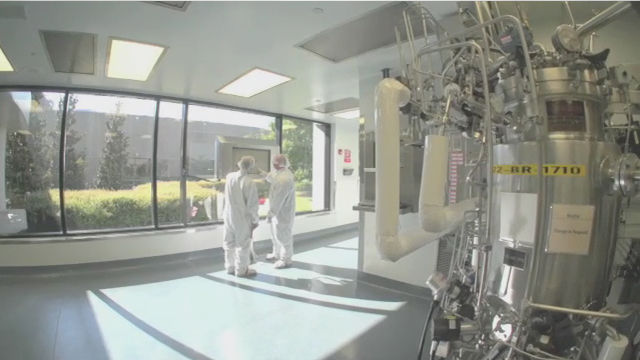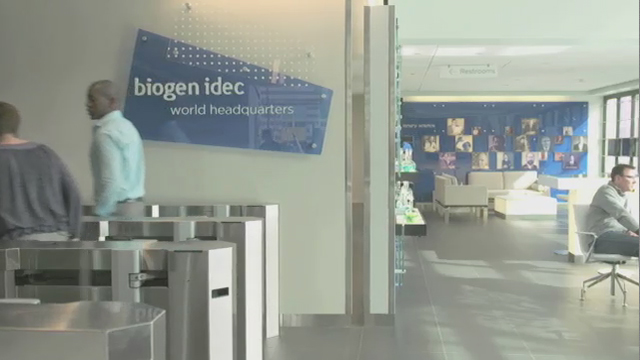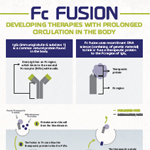CAMBRIDGE, Mass. CAMBRIDGE, Mass.--(BUSINESS WIRE)--Today Biogen Idec (NASDAQ: BIIB) announced that the U.S. Food and Drug Administration (FDA) has approved ALPROLIX™ [Coagulation Factor IX (Recombinant), Fc Fusion Protein], the first recombinant, DNA derived hemophilia B therapy with prolonged circulation in the body. ALPROLIX is indicated for the control and prevention of bleeding episodes, perioperative (surgical) management and routine prophylaxis in adults and children with hemophilia B. The therapy is shown to reduce bleeding episodes with prophylactic (protective) infusions starting at least a week apart.
The approval of ALPROLIX is the first significant advance in hemophilia B treatment in more than 17 years. The therapy is clinically proven to reduce bleeding episodes with a favorable safety and tolerability profile. It is developed using a process called Fc fusion and is the first hemophilia therapy to demonstrate prolonged circulation in the body, which has been shown in adults and adolescents with hemophilia to extend the time between prophylactic infusions.
“The FDA approval of ALPROLIX is a significant milestone for the hemophilia B community, and represents an important first step in our commitment to transform the care of people with hemophilia,” said George A. Scangos, Ph.D., chief executive officer of Biogen Idec. “ALPROLIX offers people with hemophilia B the ability to prevent or reduce bleeding episodes with prophylactic infusions starting at least a week apart. We believe this new therapy will help more people with hemophilia and their caregivers realize the benefits of this treatment approach.”
The National Hemophilia Foundation (NHF) recommends routine prophylaxis as optimal for the treatment of people with severe hemophilia. Studies show people with severe hemophilia who follow this type of regimen experience fewer bleeding episodes and their related risks. Complications of bleeding episodes may range from severe swelling and pain to arthritis, joint damage and physical disability.1,2,3
“Hemophilia has a significant impact on people whom it affects, throughout their lives,” said Patrick F. Fogarty, M.D.,4 assistant professor of medicine at the Hospital of the University of Pennsylvania, and director, Penn Comprehensive Hemophilia and Thrombosis Program. “ALPROLIX addresses a critical need by allowing people with hemophilia B to maintain factor levels with prophylactic infusions once weekly or once every 10 days. We hope this will facilitate use of prophylactic therapy.”
Hemophilia B is a rare, chronic, inherited disorder in which the ability of a person’s blood to clot is impaired, which can lead to recurrent and extended bleeding episodes. Therapies for hemophilia B can be administered either on a schedule to help prevent or reduce bleeding episodes (prophylaxis), or to help control a bleeding episode when it occurs (on-demand). According to NHF guidelines, traditional hemophilia B therapy requires prophylactic infusions two or more times a week.
“The hemophilia community is excited about new therapy options for the prophylactic management of hemophilia B,” said Val Bias, chief executive officer of the National Hemophilia Foundation. “This approval is a significant step forward because it provides an important new option and expanded choice for the hemophilia B community.”
The approval of ALPROLIX is based on results from the global, Phase 3 B-LONG study, as well as interim pharmacokinetic (measurement of the presence of the therapy in a person’s body over time) and safety data from the Phase 3 Kids B-LONG study. B-LONG study results showed that adults and adolescents with severe hemophilia B achieved prevention or reduction of bleeding episodes with prophylactic infusions at least a week apart. The study included two prophylaxis regimens – the weekly prophylaxis arm and the individualized-interval prophylaxis arm, in which the dosing interval started at once every 10 days. The overall median dosing interval with individualized-interval prophylaxis was 12.5 days; during the last six months of the study, the median interval was 13.8 days. More than 90 percent of all bleeding episodes were controlled by a single ALPROLIX infusion.
No participants in the B-LONG study developed inhibitors (neutralizing antibodies that may interfere with the activity of the therapy) to ALPROLIX. There were no reports of vascular clots or serious allergic reactions. Across the routine prophylaxis and on-demand therapy arms, adverse reactions were reported in 8.4 percent of participants. These adverse reactions included headache, oral paresthesia (abnormal sensation in the mouth), dizziness, dysgeusia (taste alteration), breath odor, fatigue, infusion site pain, palpitations, obstructive uropathy (an obstructing clot in the urinary collecting system) and hypotension (low blood pressure). Each event occurred in two or fewer study participants.
An interim analysis from an ongoing, multi-center Phase 3 pediatric study – Kids B-LONG –showed no inhibitors were detected, and the increase in half-life (a measure of the time therapy remains in the body) seen with ALPROLIX was consistent with data reported in adults and adolescents.
ALPROLIX was recently approved by Health Canada for the treatment of hemophilia B and is currently under review by regulatory authorities in several other countries, including Australia and Japan.
Biogen Idec plans to make ALPROLIX commercially available to people with hemophilia B in the United States in early May. To help address the hemophilia B community’s needs, Biogen Idec is committed to providing equitable access to therapy, as well as a variety of personalized assistance and resources through MyALPROLIX™ Services. For more information on ALPROLIX, prescribing information and financial assistance programs, please visit www.ALPROLIX.com or www.biogenidec.com.
About the B-LONG Study
B-LONG was a global, open-label, multi-center Phase 3 study that evaluated the efficacy, safety and pharmacokinetics of ALPROLIX in 123 males aged 12 years and older with hemophilia B. The study involved 50 hemophilia treatment centers in 17 countries on six continents.
The overall median annualized bleeding rates (ABR), or projected rate of bleeding episodes per year, reported in the study were 3.0 for the weekly prophylaxis arm, 1.4 for the individualized-interval prophylaxis arm and 17.7 for the on-demand treatment arm. For 12 study participants undergoing 14 major surgical procedures, treating physicians rated the ability of ALPROLIX to control bleeding as “excellent” or “good” in 100 percent of these surgeries.
Common adverse reactions (incidence of greater than or equal to 1 percent) from the B-LONG study were headache and oral paresthesia (an abnormal sensation in the mouth).
About ALPROLIX
ALPROLIX™ [Coagulation Factor IX (Recombinant), Fc Fusion Protein] is the first recombinant, clotting factor therapy with prolonged circulation in the body. It is indicated for the control and prevention of bleeding episodes, perioperative (surgical) management and routine prophylaxis in adults and children with hemophilia B. ALPROLIX is not indicated for immune tolerance induction therapy, which is a treatment for people with inhibitors, and should not be used in individuals with a known history of serious allergic reactions. ALPROLIX was developed by fusing factor IX to the Fc portion of immunoglobulin G subclass 1, or IgG1 (a protein commonly found in the body). It is believed that this enables ALPROLIX to use a naturally occurring pathway to prolong the time the therapy remains in the body. While Fc fusion has been used for more than 15 years, Biogen Idec is the only company to apply it in hemophilia.
Common adverse reactions (incidence of greater than or equal to 1 percent) from the B-LONG study were headache and oral paresthesia (an abnormal sensation in the mouth). For complete prescribing information, go to www.ALPROLIX.com.
For members of the media interested in more information and additional resources, please visit www.biogenidec.com/us_media_corner.
About Hemophilia B
Hemophilia B occurs in about one in 25,000 male births annually, and more rarely in females, affecting about 4,000 people in the United States. The World Federation of Hemophilia global survey conducted in 2012 estimates that approximately 28,000 people are currently diagnosed with hemophilia B worldwide. It is caused by having substantially reduced or no factor IX activity, which is needed for normal blood clotting. People with hemophilia B experience bleeding episodes that cause pain, irreversible joint damage and life-threatening hemorrhages. Prophylactic infusions of factor IX temporarily replace clotting factors necessary to control bleeding and prevent new bleeding episodes.
About the Biogen Idec and Sobi Collaboration
Biogen Idec and Swedish Orphan Biovitrum (Sobi) are partners in the development and commercialization of ALPROLIX for hemophilia B. Biogen Idec leads development, has manufacturing rights, and has commercialization rights in North America and all other regions in the world excluding the Sobi territory. Sobi has the right to opt in to assume final development and commercialization in Europe, Russia, the Middle East and Northern Africa.
About Biogen Idec
Through cutting-edge science and medicine, Biogen Idec discovers, develops and delivers to patients worldwide innovative therapies for the treatment of neurodegenerative diseases, hemophilia and autoimmune disorders. Founded in 1978, Biogen Idec is the world’s oldest independent biotechnology company. Patients worldwide benefit from its leading multiple sclerosis therapies. For product labeling, press releases and additional information about the company, please visit www.biogenidec.com.
Biogen Idec Safe Harbor
This press release contains forward-looking statements, including statements about the potential and therapeutic impact of ALPROLIX. These forward-looking statements may be accompanied by such words as “anticipate,” “believe,” “could,” “estimate,” “expect,” “forecast,” “intend,” “may,” “plan,” “potential,” “project,” “target,” “will” and other words and terms of similar meaning. You should not place undue reliance on these statements. These statements involve risks and uncertainties that could cause actual results to differ materially from those reflected in such statements, including uncertainty of success in our commercialization of ALPROLIX, which may be impacted by, among other things, slower than anticipated acceptance of ALPROLIX by patients and the medical community, intense competition in the hemophilia market, the effectiveness of our sales force and marketing efforts, problems with the manufacturing process for ALPROLIX, the occurrence of adverse safety events, difficulties in obtaining or changes in the availability of reimbursement for our products, our failure to obtain regulatory approvals in other jurisdictions, including in the event other companies receive marketing approval of their treatments before approval of our treatments, our failure to protect our intellectual property and other proprietary rights, product liability claims and the other risks and uncertainties that are described in the Risk Factors section of our most recent annual or quarterly report and in other reports we have filed with the U.S. Securities and Exchange Commission (SEC). Any forward-looking statements speak only as of the date of this press release and we assume no obligation to update any forward-looking statements, whether as a result of new information, future events or otherwise.
1 Nilsson IM, Berntorp E, Löfqvist T, Pettersson H. Twenty-five years' experience of prophylactic treatment in severe haemophilia A and B. J Intern Med 1992;232:25-32.
2 Manco-Johnson MJ, Abshire TC, Shapiro AD, et al. Prophylaxis versus episodic treatment to prevent joint disease in boys with severe hemophilia. N Engl J Med 2007;357:535-44.
3 Panicker J, Warrier I, Thomas R, Lusher JM. The overall effectiveness of prophylaxis in severe haemophilia. Haemophilia 2003;9:272-8.
4 Editor’s Note: Dr. Fogarty has received researched support, and fees for consulting, from Biogen Idec.



![Image of Biogen Idec's ALPROLIX(TM) [Coagulation Factor IX (Recombinant), Fc Fusion Protein], which was approved by the U.S. FDA on March 28, 2014 for the treatment of hemophilia B (Photo: Biogen Idec) Image of Biogen Idec's ALPROLIX(TM) [Coagulation Factor IX (Recombinant), Fc Fusion Protein], which was approved by the U.S. FDA on March 28, 2014 for the treatment of hemophilia B (Photo: Biogen Idec)](https://mms.businesswire.com/media/20140328005803/en/409307/4/Alprolix-Coagulation-Factor-IX-300dpi_FINAL.jpg)

![Dr. Guy Young, researcher at The Saban Research Institute and director of the Hemostasis and Thrombosis Center, both at Children's Hospital Los Angeles, comments on the U.S. FDA approval of Biogen Idec's ALPROLIX(TM) [Coagulation Factor IX (Recombinant), Fc Fusion Protein] for the treatment of hemophilia B Dr. Guy Young, researcher at The Saban Research Institute and director of the Hemostasis and Thrombosis Center, both at Children's Hospital Los Angeles, comments on the U.S. FDA approval of Biogen Idec's ALPROLIX(TM) [Coagulation Factor IX (Recombinant), Fc Fusion Protein] for the treatment of hemophilia B](https://mms.businesswire.com/media/20140328005803/en/409295/5/Guy-640.jpg)



![ALPROLIX(TM) [Coagulation Factor IX (Recombinant), Fc Fusion Protein] fact sheet ALPROLIX(TM) [Coagulation Factor IX (Recombinant), Fc Fusion Protein] fact sheet](https://mms.businesswire.com/media/20140328005803/en/409357/21/150.jpg)


